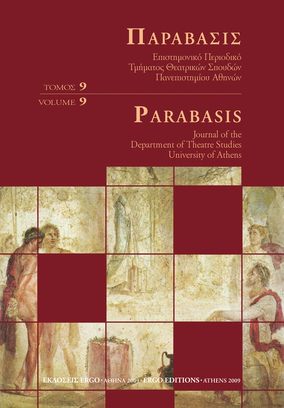What cannot be spoken : το έργο του Samuel Beckett και η μουσική
Part of : Παράβασις : επιστημονικό περιοδικό Τμήματος Θεατρικών Σπουδών Πανεπιστημίου Αθηνών ; Vol.8, No.1, 2008, pages 215-226
Issue:
Pages:
215-226
Parallel Title:
“What cannot be spoken” Samuel Beckett’s work and music
Section Title:
Μελέτες και άρθρα
Author:
Abstract:
“Beckett’s work, like music itself, endeavors to express what cannot be spoken”. This utterance belongs to Luciano Berio, an Italian composer who, inspired by Samuel Beckett’s writings, wrote avant-guarde music. The function of the musical element in Beckett’s literary opus can be summarized as exactly this endless effort to express that which cannot be spelt out with the conventional use of written speech.All of Beckett’s readers and viewers / spectators have sensed the musicality of his texts. The blending of speech and sound in his work often attains perfection; musicality derives from the original use of language, the segmentation of words, the long pauses, the meaningful silences and in general the creation of a rhythmical whole. A very large variety of sounds can be heard in Beckett’s plays: special music, songs, strident outside noises, repeated mechanical sounds, the human voice being tested in novel areas of expression, and the internal, cover-all sound of his text itself. Moreover, in many of his plays there are specific references to musical pieces.Of particular import is the place of music in Beckett’s two radio plays, Words and Music and Cascando. Beckett gives music the leading role, demoting speech. In these works, Music with a capital “M” is one of the dramatis personae, and comes into conflict with Words (in Words and Music) or with Voice (in Cascando).The musical score for Words and Music, which will form the main topic of this paper, was written by one of the most important minimalist composers of the last decades of the 20th c., Morton Feldman.The rest of the paper will be dedicated to the examination of:- Sinfonia, a concert by the Italian composer Luciano Berio, which draws its linguistic material from Beckett’s novel The Unnamable.-Neither, an anti-opera by Morton Feldman, whose libretto is Beckett’s poem of the same name.- For Samuel Beckett, Morton Feldman’s swan song, an orchestral composition dedicated to Beckett.
Subject:
Subject (LC):




